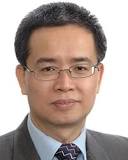

Assoc Professor Zhiwei Huang
Faculty & Department
Joint Appointments
Associate Professor, Integrative Sciences and Engineering
Education
Doctor of Philosophy, Nanyang Technological University, Singapore
Bachelor of Science, Fujian Normal University, China
Bio
Prof Huang’s major research areas are in the fields of biomedical optics, biophotonics, advanced microscopy, Raman spectroscopy and imaging, particularly centering on the development of label-free super-resolution microscopy and nonlinear optical microscopy imaging techniques (e.g., coherent Raman scattering microscopy, multiphoton microscopy) and their applications in biomolecular imaging, as well as the development of novel fiberoptic Raman spectroscopy and endoscopic imaging, enabling early diagnosis and detection of epithelial precancer and cancer at endoscopy. He pioneered in Raman endoscopy and label-free super-resolution bioimaging technologies, and published over 130 peer-reviewed articles in leading journals (e.g., Nature Photonics, Gastroenterology), and delivered over 100 plenary/keynote/invited lectures worldwide. He has filed over 20 US patents with 10 licensed for commercialization. His IMDX technique invented was ranked No.1 among the top 10 medical devices listed in Medica, Germany. He is elective Fellow of SPIE- the international society for optics and photonics. He is conference chair for the SPIE-Photonics West-BiOS conference on Biomedical Vibrational Spectroscopy: Advances in Research and Industry, San Francisco, California, United States, and also a conference Co-Chair for the OPTICA European Conferences on Biomedical Optics on Translational Biophotonics: Diagnostics and Therapeutics, Munich, Germany.
Contact Information
Welcome to Optical Bioimaging Laboratory in the Department of Biomedical Engineering, College of Design and Engineering at NUS!
Prof Huang’s major research areas are in the fields of biomedical optics, biophotonics, advanced microscopy, Raman spectroscopy and imaging, particularly centering on the development of label-free super-resolution microscopy and nonlinear optical microscopy imaging techniques (e.g., coherent Raman scattering microscopy, multiphoton microscopy) and their applications in biomolecular imaging, as well as the development of novel fiberoptic Raman spectroscopy and endoscopic imaging, enabling early diagnosis and detection of epithelial precancer and cancer at endoscopy. He pioneered in Raman endoscopy and label-free super-resolution bioimaging technologies, and published over 130 peer-reviewed articles in leading journals (e.g., Nature Photonics, Gastroenterology), and delivered over 100 plenary/keynote/invited lectures worldwide. He has filed over 20 US patents with 10 licensed for commercialization. His IMDX technique invented was ranked No.1 among the top 10 medical devices listed in Medica, Germany. He is elective Fellow of SPIE- the international society for optics and photonics.
Prof Huang’s research publications can be found on Google Scholar or ResearchGate below
https://scholar.google.com/citations?user=zSrcH8AAAAAJ&hl=en
https://www.researchgate.net/profile/Zhiwei-Huang-11
Prof Huang’s lab has PhD openings for advanced microscopy and spectroscopy imaging in biomedicine. Interested candidates with bachelor or master degrees (e.g., applied physics, physical optics, applied optics, optical engineering/instrumentation, biomedical engineering, computer science/engineering, electrical and electronics engineering, life science, r equivalent) are encouraged to email a copy of CV, a brief statement of research interests/accomplishments, as well as contact information of three references to Prof Huang at biehzw@nus.edu.sg
Recent publications (Selective)
- S Lin, L Gong, Z Huang*, Time-of-flight resolved stimulated Raman scattering microscopy using counter-propagating ultraslow Bessel light bullets generation, Light: Science & Applications, 13: 148 (2024). IF=20.3.
- W Wang and Z Huang*, “Stimulated Raman scattering tomography for rapid three-dimensional chemical imaging of cells and tissue,” Advanced Photonics 6(2), 026001 (2024). IF=20.3
- L Gong, Y Dou, S Lin, T Osipowicz, Z Huang*, Fourier ptychographic coherent anti-Stokes Raman scattering microscopy with point-scanning for super-resolution imaging, Small Methods 2024, 2400765. https://doi.org/10.1002/smtd.202400765. IF=12.4
- Y Zhang , Z Shi , Z Lai , Q Xia , Z Wang , J Wang , H Fan , C Shu , B Chen , H Li , Z Luo , W Zheng , L Wang*, Z Huang*,Phase-engineered transition metal dichalcogenides for highly efficient surface-enhanced Raman scattering, Nano Letters. https://doi.org/10.1021/acs.nanolett.4c03924 . IF=10.8
- S Lin, L Gong, Z Huang*, Super-resolution two-photon fluorescence tomography through the phase-shifted optical beatings of Bessel beams for high resolution deeper tissue 3D imaging, Laser & Photonics Reviews, 18, 2300634 (2024). IF=13.138
- W Wang, Z Huang*, Stimulated Raman scattering microscopy with phase-controlled light focusing and aberration correction for rapid and label-free, volumetric deep tissue imaging, Opto-Electron Adv 7 (8), 240064 (2024). IF=14.1
- C Shu, L Gong, Z Huang*, Bessel beam beating-based spontaneous Raman tomography enables high-contrast deep tissue Raman measurements, ACS Photonics, 11 (5), 2022–2034 (2024). IF=6.5
- W Wang, L Gong, Z Huang*, Phase-modulated multi-foci microscopy for rapid 3D imaging, Photonics Research, 12(7):1548-1555 (2024). IF=7.6
- L Xin, M Huang, Z Huang*, Quantitative assessment and monitoring of microplastics and nanoplastics distributions and lipid metabolism in live zebrafish using hyperspectral stimulated Raman scattering microscopy, Environment International, 187, 108679 (2024). IF=13.35
- L Xin, Z Luo, XG Liu, Z Huang*, Unveiling the spatiotemporal and dose responses within a single live cancer cell to photoswitchable upconversion nanoparticles therapeutics using hybrid hyperspectral stimulated Raman scattering and transient absorption microscopy, Analytical Chemistry 96 (16), 6148-6157 (2024). IF=8.0
- Y Wen, J Wang, W Zheng, J Zhu, X Song, T Chen, M Zhang, Z Huang*, J Li*, A supramolecular colloidal system based on folate-conjugated β-cyclodextrin polymer and indocyanine green for enhanced tumor-targeted cell imaging in 2D culture and 3D tumor spheroids, Journal of Colloid and Interface Science, 2024. Journal of Colloid and Interface Science 667, 259–268 (2024). IF=10.73
- Biophysics and Bioengineering
- Biomedical Optics
- Biophotonics
- Bioimaging and Biosensing
- Biomedical Raman spectroscopy and Imaging
- Coherent Raman scattering microscopy imaging
- Multimodal nonlinear optical microscopy imaging
- Label-free super-resolution microscopy
- Super-deep tissue imaging
- Optical diagnosis and therapy of early cancer
My Mentoring Style
How would you describe your mentoring style in terms of freedom given to your students?

Selecting Research Topics?
How do you guide your PhD students in selecting research topics?

Setbacks / Challenges
How do you handle setbacks or challenges faced by your PhD students?

Feedback
How do you give feedback on your students’ thesis drafts and progress?

Consultation Frequency
How often do you typically meet your PhD students one-on-one for consultation?

Research Group Meetings
How often do you typically hold lab meetings where your PhD students present their research work to the class?


